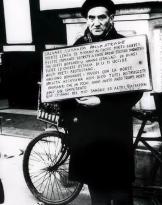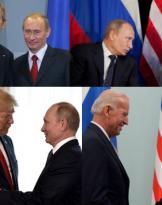(Continue) Since its inception the Nocs has undergone a great evolution ...
Andrea Mainardi - That's it. The department was born for the fight against terrorism, but then dealt with kidnappings, to then get to the fight against organized crime until today that we have an emergency again, this terrorist threat that we do not know how and from where can come. And which therefore obliges us to carry out a comprehensive prevention activity, which is almost impossible given the context. We work on the territory with a model that is being implemented not only in Italy. Even before the events of Charlie Hebdo, we were aware that the danger is often inside and that we must try to find ourselves there while they are striking.
Armando Silvestro - Remaining in France, remember the Bataclan attack? The policeman inside the club, who eliminated one of the terrorists who were shooting, still saved 20-30 people. Just because it was on the spot! In the tragedy, if you do not eliminate the problem, however, it is limited a lot. Timing is important. In this, I must say, Commander Mainardi had the ability to design in this sense ...
M - It was a shared project, where everyone works together.

S - Precisely for this timing, important, it was provided - then the commander has informed the summits - to create the famous Uopi (operational units for emergency response) that are on the territory. The Uopi can act in case of necessity and then, if things should go wrong, we will intervene for a definitive resolution.
But this is not happening even at the European level?
M - Yes, that's what all the police forces are doing at a European level, a group called First-response: the special groups create units for a first response which is fundamental. Returning to the Bataclan, two hours passed before intervening and the terrorists made a massacre. So it was understood that people in the area are needed, but not "the steering wheel", because it is not structured for such interventions, if the car is shot at it, it will be punctured ... special units are needed which, however, are always numerically reduced. In Italy we have decided to expand the courses and, with adequate training, create here by us operational units on the ground, selected and prepared.
Now they are present in 20 city of Italy, go around with armored cars, protections like bulletproof vest and structured to be able to give an immediate response in front of an attack of violence such that the normal policeman, who is also trained, would not be in able to face, because it has no armored car, neither a ballistic shield nor the protection of a bulletproof vest suitable to deal with these emergencies. Let's say that the Kalashnikov, the Ak 47, has a penetrating power that the bulletproof vest alone does not stop, so it also takes the armored car and be able to face those on the other side.
And who is on the other side, in general, the Ak 47 has it always ...
M - It is a weapon that gets easily and with very little money and is terribly effective. Obviously, we must cope with the threat that has grown and in a form that is not that of former terrorism. In the attack that becomes dramatically strong.
 And then there is the problem of single cells, sleeping until new order.
And then there is the problem of single cells, sleeping until new order.
M - There are lone wolves, which attack suddenly and are difficult to spot. Our management, in this sense, works very well because we have been able, up to now, to stop any outbreak. But it is also true that a terrorist who hits Paris does not take anything to get to Milan, the border does not exist. Therefore, there is a whole discussion to be made globally. A united Europe is also this, it is also united in the crisis and in the threat.
Now the terrorists, in this case of Islamic matrix, are no longer necessarily just Arabs, so the phenomenon of complication.
M - You can not generalize ...
S - The system must be enlarged and modified. If at the birth of Daesh / Isis immediately intervened in the territory, the phenomenon did not expand until this point. I think we intervened late. And now, even if we eliminate them there, in their conquered territories, their roots are a bit 'on all sides and do not get easily eradicated. But we have the good fortune that the Italian Antiterrorism is so well structured in the territory, from the times of the Ucigos, that we manage the phenomenon.
M - In Italy we have an excellent police, without making comparisons with the foreign one, but built and developed on the terrorism we have had at home, on the experience we have had. It is obvious that the skill, towards the competitor with whom you are going to compare yourself, is that if you are faced with a serious threat, the police must grow, otherwise they will succumb. And so with terrorism, the knight passed us (Silvestro, ed…), we had to grow up and we did it very well. Same thing with the fight against the mafia, where we managed to do things that others do not even dream of and not only on a structural and operational level, but also on a legal level and in terms of means with which to fight organized crime.

This is an excellence that envies us abroad ...
M - When I was working in Dia (Anti-Mafia Investigation Directorate) many years ago, former French Prime Minister Manuel Valls, then Minister of the Interior, came to visit and was amazed that by the anti-mafia legislation we were able to immediately confiscate the assets of the mafia and use them for the benefit of the police force. From them in France, he said, with the legal system that they have which always tends towards hyper-guaranteeism, such a thing would be fundamental. In the south of France there are no French mafia but there are Italians transplanted there, second generation with "ius soli", of French citizenship but connected with Calabria and other places in Italy. There are some areas in the south of France that are disturbing, those inside Marseille are dramatically the subject of mafia investments. The French can no longer get out of it. We, on the other hand, have built an excellent legal system.
Marseille, has not always been a bit of a free port? Also for the relationships between Italian and French offenders and for decades ... Only we reacted immediately ...
S - Those are the principles I told you earlier. Our advantages are linked to the misfortunes experienced for years, from bombs to Naps, Nar, etc. While elsewhere they have always had ups and downs, we have always been in a country under constant tension, a continuous concentration that has led us to be already structured for today's terrorist emergencies. Even if the Red Brigades from the 90s have gone out of the scene a bit. Of course, there is always monitoring, but they no longer arouse the concern of the past, the era is now different but this always being on the alert has led us to never let our guard down.
 Also for phenomena like those of the No Global?
Also for phenomena like those of the No Global?
M - They are phenomena that are hidden and that could explode. It is not our business, other colleagues deal with it, but the monitoring of all these fringes is continuous, because the terrorist of tomorrow could be hidden there. It seems absurd that the latter can be born from a violence to a railway line, and yet it is so. Unfortunately, humanity has these excess peaks.
Obviously the railway line is an excuse ...
M - It's an excuse to express dissent that could turn into bombs and so on. It is also obvious that the maximum attention is on external terrorism, because it is the one that is hitting with bloody attacks all over the world, but the guard does not even lower the other parts. And I must say that the system works very well for us, our management has a frenetic, constant and growing activity. And so far, by making the debts owing, in Italy we have not yet seen an attack like those that hit Europe.
S - And, on the other hand, there have been so many preventive arrests, so many expulsions. Preventively many things are done that people forget. There is no need of striking facts, it is a constant work of control of territory, people, mosques.
S- Her name is Federici, so the name is quite another thing ... but she looks a lot like Adriana Faranda, a famous brigadist, Valerio Morucci's partner. They were arrested in the Prati area of Rome. Not to be confused with the other Faranda, who was a deputy of the Pdup.

Do you look like him, Cavalier Silvestro?
S - Very…
It was a special period, between seizures and the fight against terrorism.
S - Definitely. Look, with all the films and fictions dedicated to terrorism that they gave on TV, "The Best of Youth", (directed by Marco Tullio Giordana), really represents the cross-section of that era, from the years 60 on, on terrorism and politics. It also refers to the angels of the mud of the Florence flood.
M - It is the story of a terrorist born in a bourgeois context, as has really happened, think of the son of the deputy Carlo Donat-Cattin. It is the folly of a system that involved, in a middle-class environment, people who went against the system itself.
S - But the technical steps are right, because the protagonist from a bourgeois context becomes sympathizer, then terrorist, goes to Rome, give her the case with weapons, becomes a fugitive in all respects.
A situation from which it was difficult to leave.
S - Several came out when there was the blockade of terrorism with the advance of the police force… Let's say that a part of third level sympathizers took a step back and got out in time. Not everyone was known by the police and Digos, today it could be anyone.

In that being against the "system", we can say that there was a certain sympathy towards the Red Brigades because against the politicians? That hatred that is only more evident today, was already there in those days ...
S - Wait a minute… this thing is also true. However, when they kidnapped Aldo Moro, there was a tactical error on the part of the Red Brigades. They, perceiving this sympathy, thought that the Italians would support them. Instead, let's face it, the tension that created the Moro kidnapping was enormous. Fear was everywhere, even in kindergartens. People, instead of rising up against the system, were afraid. Because they also hit a person considered meek, the symbol of dialogue between opposing political parties.
M - The attack made on that figure was incongruent. And it was a relapse against them.
S - Do you know what the recurring phrase is when someone is stopped by a patrol? "With all the delinquents around, stop me right?" ... What's that got to do with it? Those are sample checks. People want security without reckoning with their freedom, without losing anything. It is an all-Italian concept. If everyone does what they like, it's not good. There are rules and must be followed. Everything has a cost.
Among the various photos in the corridor outside, there are some of you with the paratroopers thunderbolt. Do you also work with other special forces departments?
M - We did skydiving courses with the Folgore because the military type patent was considered more appropriate, even when we are confronted with foreign departments. In Italy we are associated with the Gis of the Carabinieri with whom we relate to many things. Abroad every six months meetings are held with all the commanders of the special departments, for the project called "Atlas" where one compares and prepares possible joint trainings in various countries of Europe including Italy. There is also a European law that provides that, in case of emergency or critical situation, a country that has its own special insufficient department can request the sending of special departments from other neighboring countries. Of course the thing is theoretical, because all the special departments think they are better than the others ...
S - The problem is the timing. If something happens, before the various special departments get together they need it and spend some time. Of course, if there are people in training and something happens in that place, it is clear that we can think of a joint intervention because the team already exists.
Read the first part: "Sicut Nox Silentes, "Silent as the night": at the base of the NOCS - History and evolution"

(photo: Nocs / Valerio Giannetti / author / web)












